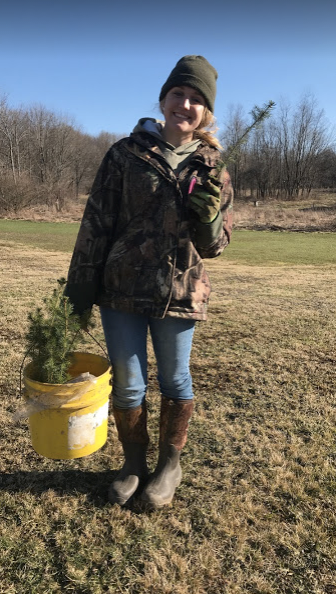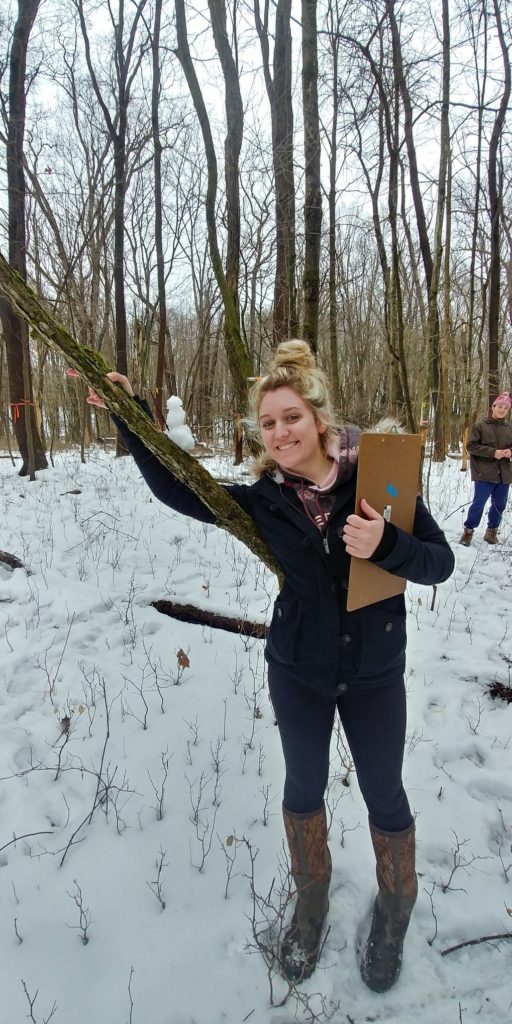Bailey J. Kozalla, our March 2021 Student Voice

Written by Bailey J. Kozalla, Allegheny College, PA
Editor’s note: We asked Bailey what excites or fulfills her the most about her current field of study? Why does she major in, or research the subjects she has chosen? Her response follows, along with a bit of advice for her peers. Watch for more stories from current students each month in the Across the Landscape e-newsletter, and in the upcoming Forest Steward magazine printed by the Guild in spring 2021. Thank you for sharing, Bailey!
During my teenage years, I was indecisive about my career plans while planning for life after high school. I contemplated computer science because I had a knack for technology, and I briefly thought about following my mother’s footsteps in the medical field. Despite these options, I was always drawn to environmental science. I was introduced to the wonders of the natural world through my parents when I would tag along on deer hunts and fishing trips when I was around eight years old. As I progressively became more involved, I decided to complete my hunter-trapper education course and purchase my first hunting license at eleven years old. Over the years, I had found a sense of identity in the outdoors. My appreciation for the wild and the animals and plants that thrived there would eventually become my inspiration to dedicate and develop my professional goals towards it.
I started my freshman year of my undergraduate program at Allegheny College with a planned major in environmental science with a concentration in forestry during the fall of 2018. There was never really an “ah-ha” moment that triggered my interest in the forestry field, but rather my growing understanding of being a knowledgeable steward of the land brought purpose to my affection for the outdoors. With sustainable management of forests, the animals and plants that inhabit those forests will thrive for future generations. This virtue of sustainable forestry is what inspired me to be a part of the environmental field.

Before I started college as an environmental science student, I never really put much thought into the actual process of eventually becoming an environmental scientist. That was something that I thought would just come naturally. Both my peers and professors, however,
pushed me to exceed my limits and expectations that I had originally set for myself throughout the past three years as a student. I learned that I loved not only the hard-science of forest management and research, but also telling the story of environmental stewardship. One of the ways that I accomplish this is through Geographic Information Systems (GIS). Before college, I never knew what GIS was or why it is so influential in solving some of the toughest environmental problems. Now, I have found that GIS plays a huge part in my niche as an aspiring environmental professional. I love the hard work and deep thinking that goes into scientific and environmental problem-solving, but I also have come to love the art of conveying the solutions into the form of a story.
One example of this passion of mine was this past fall when I enrolled in a semester-long independent study in GIS. The project utilized an ArcGIS Story Map to create an online, interactive map for the Foundation for Sustainable Forests (FSF), located in Spartansburg, Pennsylvania. A non-profit organization that focuses on sustainable management of forests for future generations, the FSF is growing its online presence for its members and the community. This map displays the FSF’s conserved lands, as well as photos, descriptions, and other facts about each property. This was one of my favorite projects I’ve completed, as it not only provided me with invaluable experience with telling conservation success stories, but it also was easy to see the positive impact it had on my community and the purpose behind those many weeks of hard work.
This upcoming summer, I hope to utilize the techniques I’ve learned thus far as an environmental science student during an information and education internship I recently accepted at the Pennsylvania Game Commission. My advice for anyone who is skeptical about pursuing a career in the environmental science field is to just go for it. Use your passion for the outdoors and build it into your professional goals. There’s things out there that you don’t even know you are good at! The field is challenging, but just as rewarding. It’s been difficult in some aspects, but every part of the journey has been worth it.
